"Look for me, for I might die very soon." Story of National Guard soldier who came back from the dead and has been named Hero of Ukraine
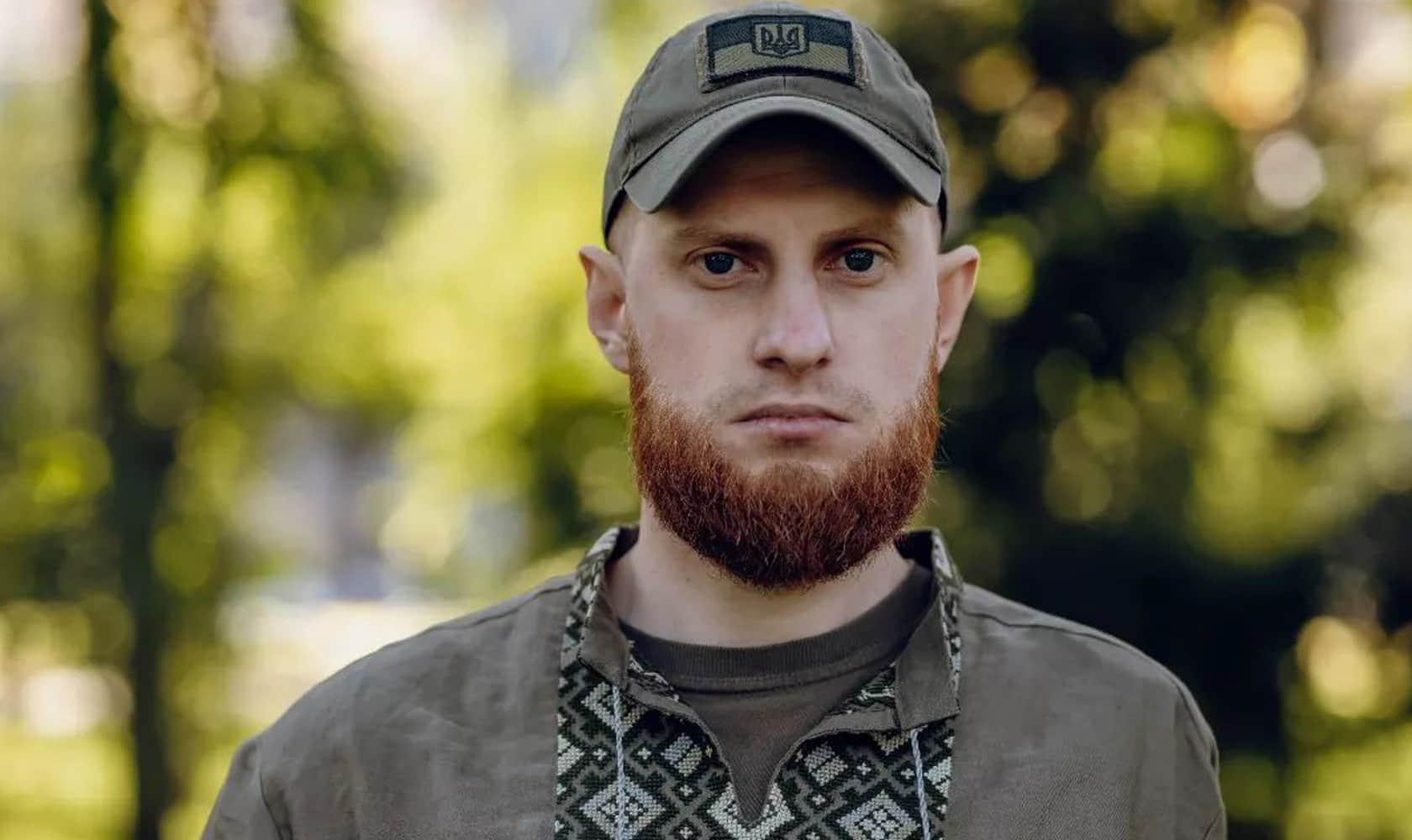
When the 29-year-old Dmytro Finashin, who goes by the alias Fin, was given a shockproof shield and a rubber club in the National Guard, he was not happy.
Since early childhood, Dmytro, born in Koziatyn, had dreamt of becoming a soldier. But after the Maidan protests in 2014 [also known as the Euromaidan or the Revolution of Dignity - ed.], he was not pleased at serving in the National Guard unit based in the capital. Therefore, he went to serve for three years with the Kulchytsky Battalion and gained combat experience in Donbas.
Even before the full-scale invasion by the Russian Federation, he became the commander of an aerial reconnaissance platoon. After having been promoted to the rank of senior sergeant, he retrained as a sniper.
On 24 February 2022, the war met the future Hero of Ukraine in Popasna, Luhansk Oblast, where he had arrived with his unit the day before.
Three months later, during the Russian forces’ sweep throug Yakovlivka, Luhansk Oblast, Dmytro Finashin and his comrades were surrounded. After many hours of battle, the soldier persevered but was the sole survivor of the unit, with numerous injuries.
Through the radio of one of the dead Ukrainian soldiers, the Russians invaders announced: "All yours are ‘two hundreds’ [code for dead soldiers - ed.]; we finished off the wounded."
For two days, Finashin was bleeding, drinking water from the swamp, trying to warm up. His mind was overtaken by hallucinations, in which his compatriots came to him but for some reason were unable to evacuate him.
On the third day, a senior sergeant, barely alive but moving towards his Ukrainian compatriots, was found by Maksym Buhel, a holder of the Order For Courage, of the 80th brigade.
In hospital in Dnipro, Dmytro Finashin’s left arm was amputated.
Impressed by Fin's story of survival and his lust for life, the President of Ukraine conferred on Dmytro the title of Hero of Ukraine and awarded him the Order of the Golden Star.
In an interview with Ukrainska Pravda, Finashin talks about the value of life, the painful sense of unfinished business, a trip to the United States and Ukrainian heroes.
What follows next are Dmytro’s words.
In cold blood
In combat, about 75% of survival depends on luck. There are innumerable chances to "become Cargo 200" [to die - ed.]. I could have paid a much higher price than my left hand and right finger.
If a bullet had pierced my helmet a centimetre to the left - that’s it, goodbye, all! It hit my arm straight under the collarbone, and went back out of my body. Had it been a few centimetres to the side, [it would have hit my - ed.] heart or artery or spine. A few [centimetres - ed.] higher, my head.
In moments of crisis, the main thing is to try to turn down your emotions a notch, to do everything in cold blood. But in the situation I was in, there came a point when very little depended on me.
I couldn't even find the strength to move to keep warm. Then my mind conjured up hallucinations that were stronger than my desires or willpower, and I almost unconsciously did what I needed: look for water, keep moving.
The body itself found motivation, incentives [to go on - ed.].
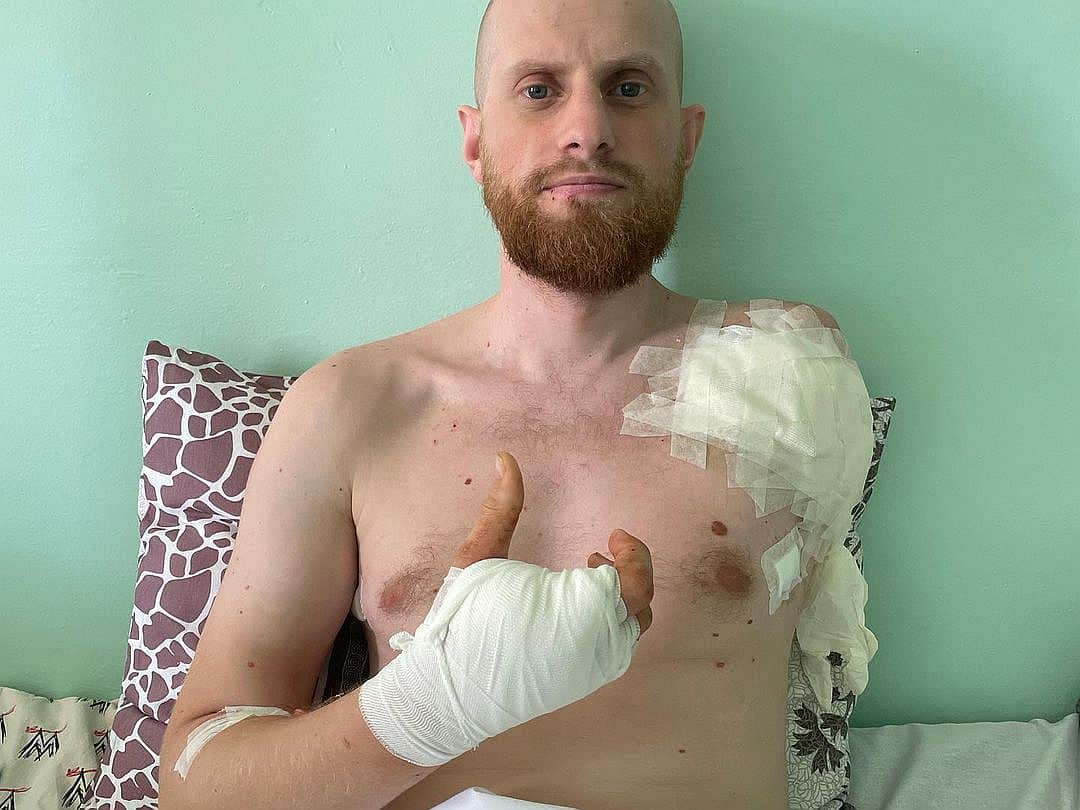
First of all, in war we must constantly have "medicine" [medical supplies - ed.] with us. I had three tourniquets. Two on my bulletproof vest, on the sides, under each arm to be able to get them quickly. One was on my belt.
Secondly, you should always have water with you. I don’t know the reason for this foolishness, but many soldiers neglect this rule. If you have no water after being wounded, you will die fairly quickly.
Thirdly, provisions. I had food inside the armour, protein bars from our emergency rations. But after I was wounded, the bulletproof vest was removed from me and I was left without anything.
Well, you need to have a backup communication source with you. If I had had a cellphone in my pocket, in my pants, holding a charge for half a year, I could have called and said: "Guys, I'm actually alive here! [laughs]. Come get me! "
I really had very little left. I was counting the hours before I would finish this story. On the first day, when it seemed that I was surrounded by the "orcs," [Russians - ed.] I did not see any opportunity to get out: "That's it, I have to die."
There was no fear of dying. My service in the ‘atoshka’ [Anti-Terrorist Operation, Ukrainian counter-terrorist operation against Russian-backed insurgents in the east of the country - ed.] had left its mark on me: I always tried to do my job in cold blood, to approach it from a practical point of view.
But there were emotions when I was hallucinating. When I talked to imaginary friends. I was infuriated that they left me to perish.
Emotions in the war are deadly.
Finally
Koziatyn is a city of railway workers. There are no military units nearby. I was born into a family of railway workers, but decided to become a soldier. It started in a sense in my childhood: assault rifles and soldiers, all these boyish toys. A typical story.
Koziatyn borders on Zhytomyr Oblast, and boys there often went to do their "srochka" [compulsory military service] in the 95th [Air Assault Brigade – ed.]. All were paratroopers (laughs).
Once a friend's father, who worked as an enlistment officer, said: "Listen, you have a romance in your head, but you will only be there sweeping and moving things from place to place."
I thought about it and didn't go.
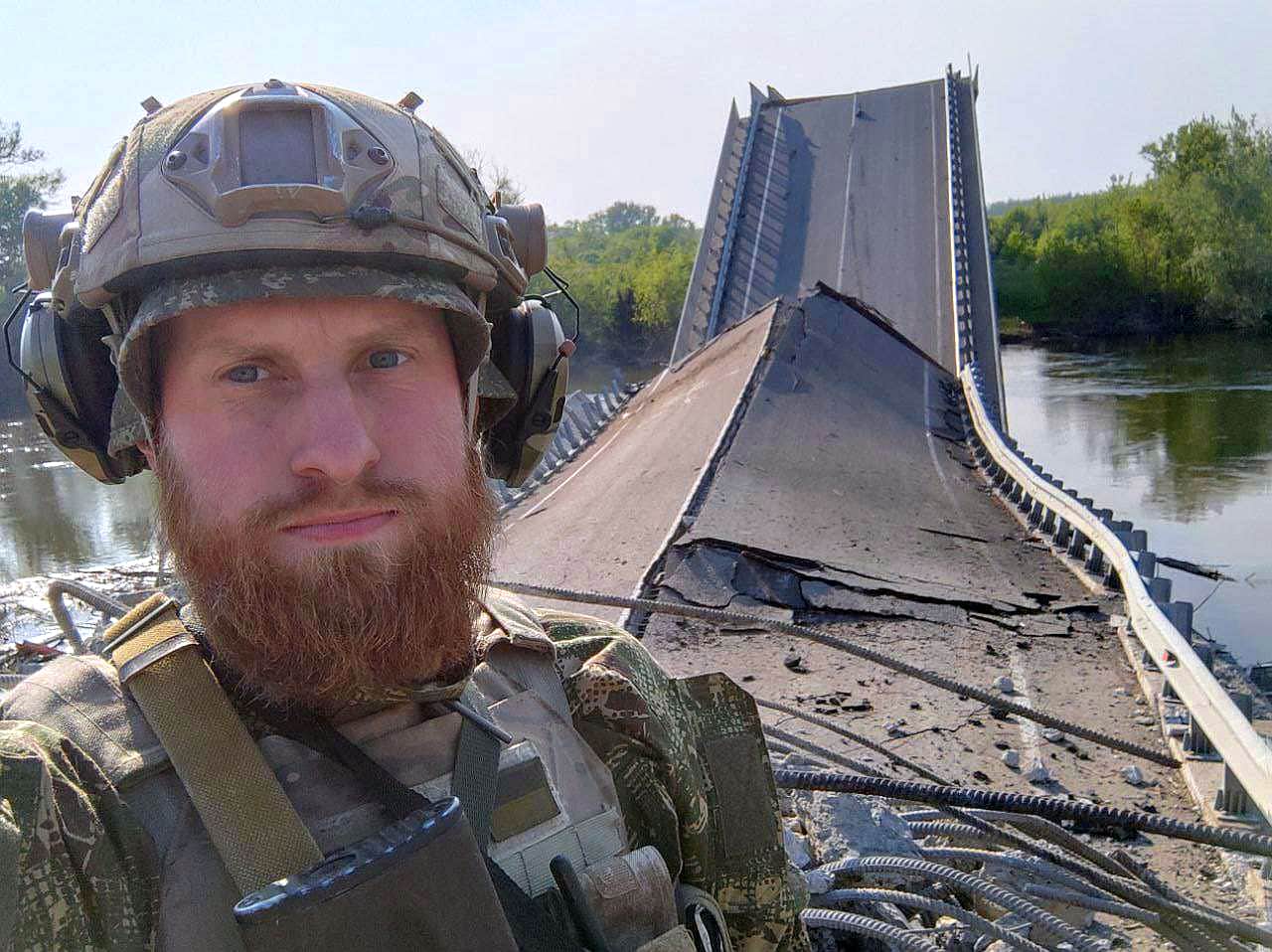
"After 2014, when I was eager to join the army, there was enormous pressure from all sides. Relatives, girlfriend, mother said: ‘What army? They kill people there!’"
When the war started after the Maidan protests, the fact that I was not participating in such important events was gnawing at me from the inside.
And so, I went to my neighbour, the enlistment officer: "Uncle Kolia, I've made up my mind: I want to join the army. But preferably in Kyiv. My girlfriend is studying there. I want to join a regular unit so that I don't just sweep, but do something."
He says: "There is one elite unit. I will arrange something for you there." That's how I got into the unit of the National Guard responsible for protecting public order, without even realising it [laughs]. They handed me a shield and a PR-73 – that is, a rubber stick.
Three years of my service were coming to an end, I was planning to resign because I didn't see the point in it. I got to know the "Kulchytskyi" [General Kulchytskyi Battalion – ed.] during training. I saw that the unit was cool: motivated, spirited, patriotic. Constant rotations to the front.
I transferred there and was able to finally reveal myself as a soldier.
Help
During the two days after I was wounded, I constantly turned to my relatives in my mind: "Come on, look for I might die very soon." It was not because of fear, but more out of the instinct of self-preservation.
It was scary only when I saw the boys coming towards me. I thought it was the Russians. I had suffered so much over two days, and now they will torture me. I really didn't want that.
Did I remember the words of my mother, my wife, who had discouraged me from joining the army? At times, yes, but before that injury. For example, in March, when we still didn't have any shelter, we were bombarded by a plane for a very long time.
Every 30 minutes, the plane went on the attack, striking without aim, at the forest, in our sector. It dropped bombs, flew away and returned again.
And every time you think you’ve reached the lowest point, every time you think: "That's it, this bomb is for me!", it flies, whistles, and your thoughts are like: "Damn, my mother used to tell me: 'Study hard at school.' And you, moron, joined the army!" (laughs).
Or, when it's very cold, when you're freezing, you think: "Normal people are sitting in warm offices now, working, and you're lying on the street, and it's unclear how much longer you have to lie here."
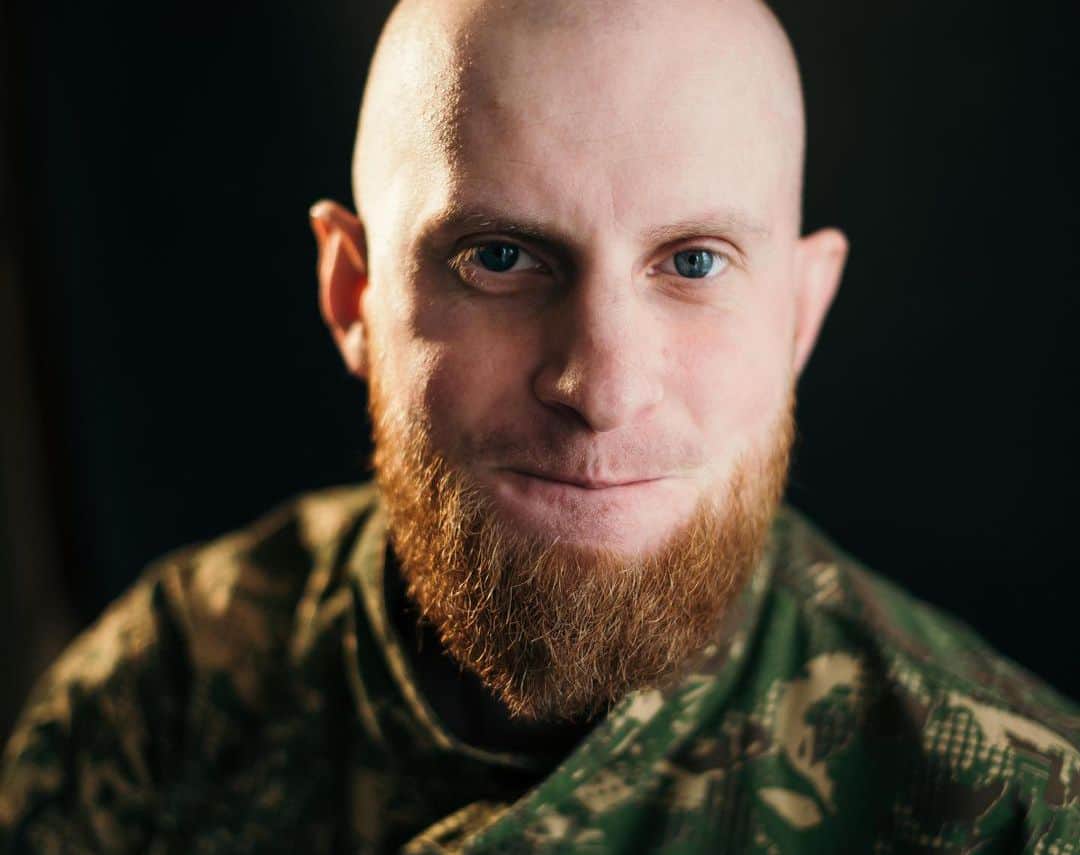
I have gone through this before: "The boys are fighting over there, and you are smoking hookahs here in the rear!" Even earlier, before the full-scale [invasion], I reached the conclusion that we are at the front so that people may not know what war is.
But it is essential that people should not forget the cost. That people should not say that they are tired.
We must continue to help the army. "Regulars" [Regular army], service contracts [contract soldiers] are running out, and the number of those mobilised is huge. Please help them and the country win. The sooner we win, the fewer people will suffer in this war.
Help reduce losses.
Unfinished business
There are never any air raid warnings or sirens at the front. When you first return to the rear, and it's all howling, it's a bit creepy actually [laughs]. A creepy thing.
Without weapons, without ammunition, it feels as if you are naked, barefoot. I had felt it even before the full-scale invasion. Once I came back from a rotation, I woke up at night and started frantically looking for a gun. I'm looking, I'm looking, until: "Damn, what are you doing?! You're home."
Weapons provide a sense of security. You understand that you can protect yourself, especially if you know how to use them. That's why, actually, when I returned, we got my wife a weapon. And I'm almost finished making a rifle for myself. It's very uncomfortable without it, to be honest.
When you're at the rear, there's a constant sense of unfinished business. It is a very strong, difficult story: you have served for so many years, and now you are leaving the army, leaving the boys, sitting in Kyiv, and everything is fine with you.
Everyone who has even a little bit of military experience has this sense of responsibility for the boys. It comes from the fact that your life depends on others, and theirs depends on you.
A new bond is formed between people. Even if mentally you are not compatible and would not be friends in ordinary civilian life.
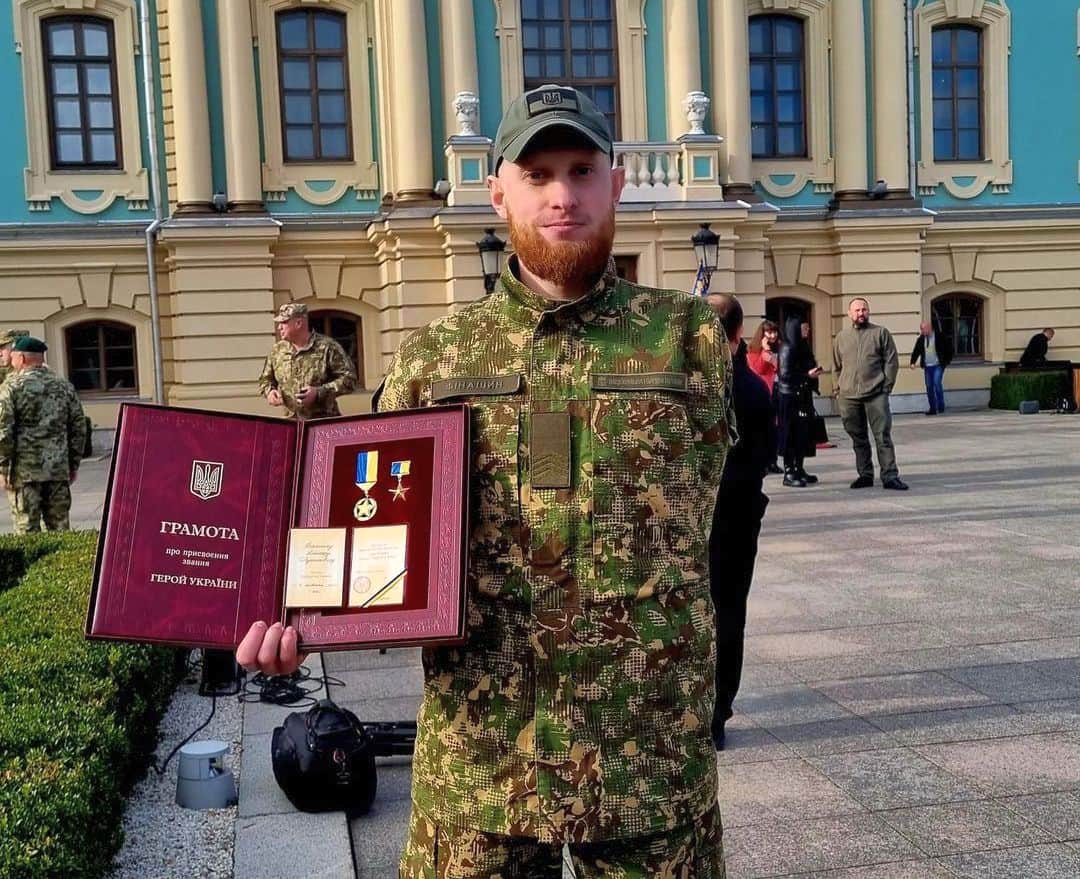
My family treated my military service even more harshly [laughs] after I was wounded and received an award. Earlier, I could make a unilateral decision, "That's it, I'm going to be a sniper!"
But now my wife says, "Don’t even try to go somewhere on a rotation! I've waited for you once, and I don't want to go through that again. If you go, I'll divorce you." After that, I'm sitting and don't know whether she's joking [laughs].
I understand her and my mother. For two days, they did not know if I was alive or dead. And then, for a few more days, until they arrived at the hospital in Dnipro, they wondered how severe my wound was, whether I would be, excuse me, like a vegetable.
I tell them that I will no longer storm the landing. Physically, I can't do it, no matter how much I may want to. But they still don't want me to return to active service.
Gratitude
While I was in America for rehabilitation, I was most impressed by the veteran movement and the attitude toward veterans.
One day I happened to meet a man on the street who, as it turned out later, fought with us in Kharkiv Oblast as part of the Foreign Legion. Then he came home for a rotation, and his wife stole his passport. Now he cannot go back to Ukraine [laughs].
Well, I got to know him, we only talked a little, but now he writes to me constantly, "Buddy, stay strong. We have to help each other". And it's fantastic. Such people not only talk but also act.
If, for example, someone in Ukraine constantly wrote and communicated with me like that, I would think that man is like [pause], a little burned out by the war. A little overheated somewhere from the front. This is not typical for us, but in the US, it is the norm.
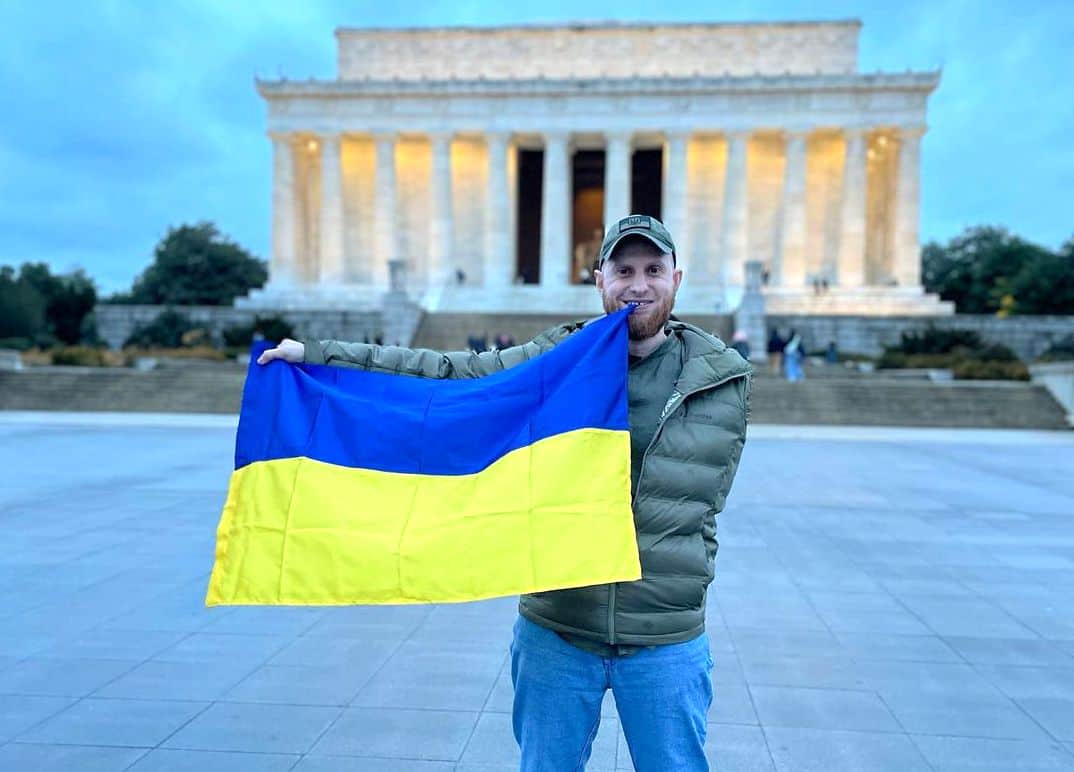
One day, two injured guys and I decided to try an American Mac [McDonald's – ed.]. There was a man there, a real hobo, filthy. He opened the door and said, "Sir, thank you for your service". "Excuse me? I'm from Ukraine," I told him. "You protect the peace, fight for good," he said.
Or an ordinary woman walks by, gives you 20 dollars, and says, "This is for coffee." You say no, it’s not necessary! And she gets offended when you don't take money.
People in the US understand the price of freedom. Those who cannot participate directly in this war try at least to express their gratitude in some way. They explain that they remember what is happening in Ukraine.
One of our boys, who has a prosthetic leg, told us he was sitting in a cafe in a camouflage jacket. He asked for the check, but a waiter said, "They have already paid for you". Someone saw him, didn't even approach him or say anything, just silently paid.
Till the end
I don't really like it when the military's actions are treated as heroic. But if you see what they do, it's real heroism.
For example, Maks Buhel, the group commander that found me, is a very cool man. Very very cool! He took part in the Battle of Donetsk Airport and is a Knight of the Order For Courage. He also holds the Order of Bohdan Khmelnytsky. He was wounded, but he is still in the army. An officer, he visits the positions and goes on mop-up operations with the boys.
If you listen to the stories of our soldiers, there are hundreds, thousands of heroes. I haven't mentioned anyone else now, but the day after the interview I'll think, "Damn, why didn't you tell them about this or that person!" [laughs].
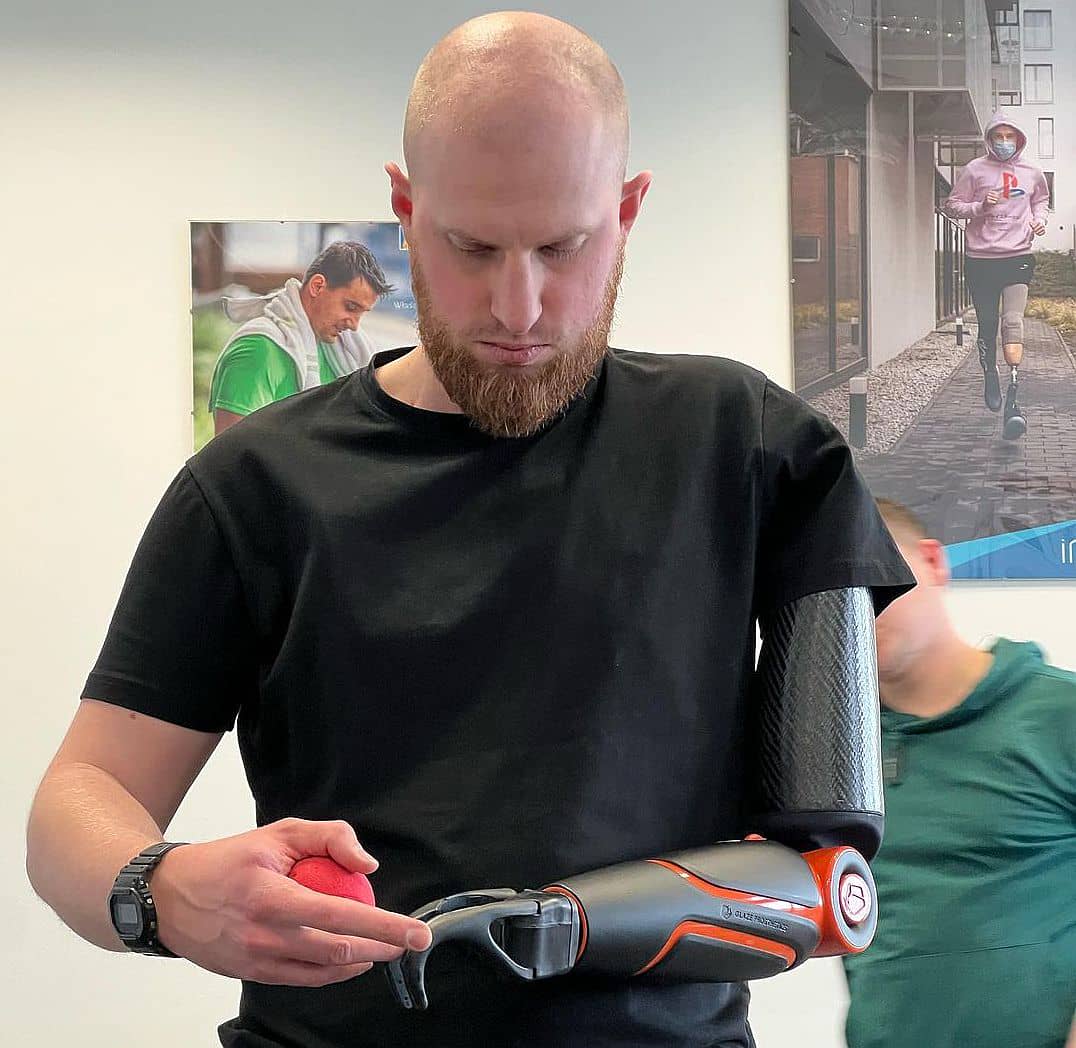
I said that everything in the world is relative, even before I was wounded. But now I realise all the more that it could always be worse.
You should never complain. Someone is always in a worse situation than you are. We must thank our good fortune, fate. Never give up.
When I was wounded, at some point I lost faith that I would survive, yet I did. And this alone motivates me to continue living life more fully and richly. I was given a chance that should not be wasted.
Life is fleeting; you never know when it will end. Enjoy, appreciate every minute of it. Moreover, every minute of your life, someone is giving his or her life for this.
I believe that everyone at the rear who does not participate actively in the war has no right to whine or give up.
Ukraine must win. We have no other choice. This is a fight for survival.
I tried to imagine the Russians showing up here: military, police, whoever. How unpleasant it would be for me and my family. And I could not imagine such a situation.
We have nowhere to retreat. We have paid too much to lose.
We must continue to the end. To victory.
Yevhen Rudenko for Ukrainska Pravda
Translated by Theodore Holmes, Sofiia Kohut, Tetiana Buchkovska
Edited by Monica Sandor